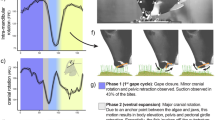Abstract
RADULA movement in prosobranchiate gastropods is a factor in the predator-prey relationship of many species of gastropods (Naticidæ, Muricidæ and others) and other molluscs, involving considerable masses of animal life in the sea.
This is a preview of subscription content, access via your institution
Access options
Subscribe to this journal
Receive 51 print issues and online access
$199.00 per year
only $3.90 per issue
Buy this article
- Purchase on Springer Link
- Instant access to full article PDF
Prices may be subject to local taxes which are calculated during checkout
Similar content being viewed by others
References
Jensen, A. S., Nature, 167, 901 (1951).
Jensen, A. S., Vidensk Medd. fra Dansk naturh, Foren., 113, 251 (1951).
Cuvier, G., “Memoire pour servir à I'histoire et à I'anatomie des mollusques” (Paris, 1817).
Huxley, T. H., Phil. Trans. Roy. Soc., 143, 29 (1853).
Geddes, P., Trans. Zool. Soc. London, 10, 485 (1879).
Gunter, G., J. Acad. Sci., Wash., 26, 361 (1936).
Carriker, M. R., J. Morphol., 73, 441 (1943).
Ankel, W. E., Zool. Anz., 11, Supp. 223 (1938).
Author information
Authors and Affiliations
Rights and permissions
About this article
Cite this article
GUNTER, G. Radula Movement and Boring Efficiency of Gastropods. Nature 169, 630–631 (1952). https://doi.org/10.1038/169630a0
Issue Date:
DOI: https://doi.org/10.1038/169630a0
Comments
By submitting a comment you agree to abide by our Terms and Community Guidelines. If you find something abusive or that does not comply with our terms or guidelines please flag it as inappropriate.



